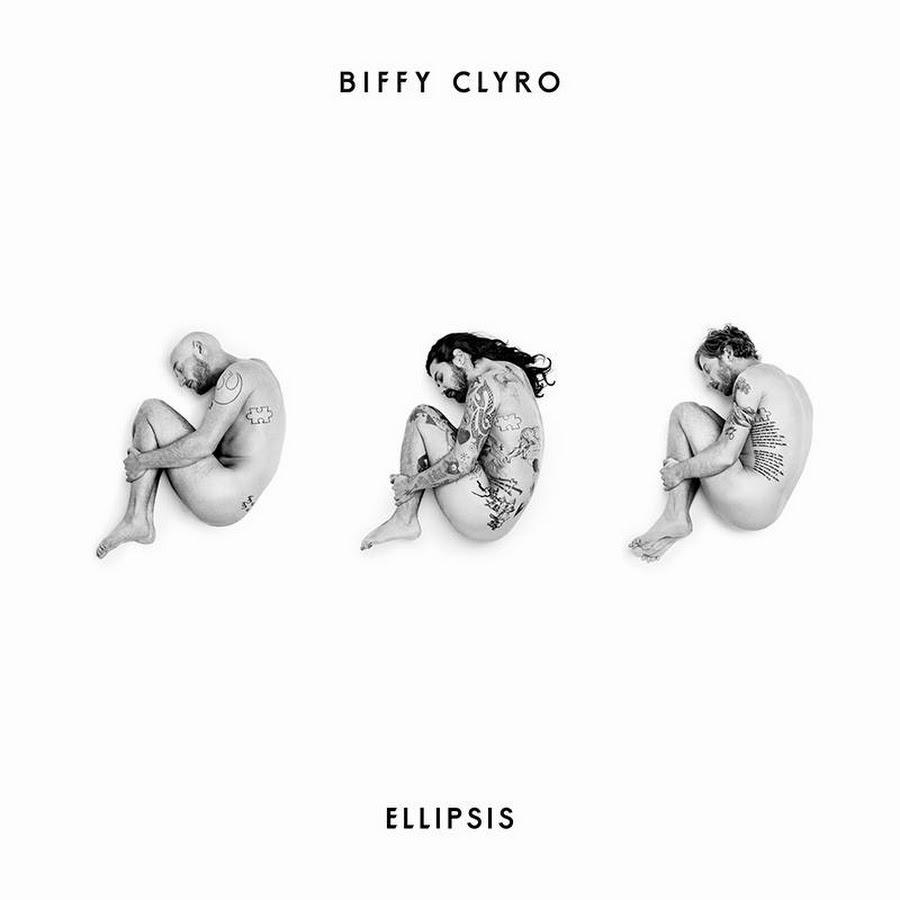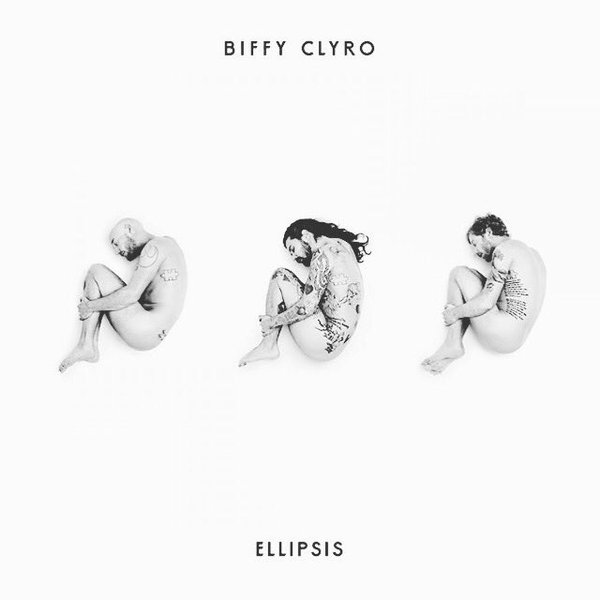There is that Morrissey line that seems rather pertinent when discussing the latter part of Biffy Clyro’s career: we hate it when our friends become successful. Witnessing one of the UK’s most beloved cult acts completely dominate the charts was always going to be true sight to behold. On their journey to the top however, the group lost what made them so fascinating in the first place; their ridiculous tonal shifts sidelined in favour of more straightforward pop-oriented direction. Their previous album – the bloated, underwhelming double album Opposites – was a testament to this fact as none of its twenty songs contained a hint of the spark that fueled their first three efforts. Despite promises of a “return to form” and a mingling of the new and old, Biffy Clyro’s seventh album Ellipsis is simultaneously disappointing and embarrassing as the trio toothlessly try to eat their own tails in a sterilized bubble.
Ellipsis’s mission statement seems to be trying to rekindle the final embers of Biffy’s youth and use them to power U2 sized stadium hooks. While this works occasionally, it mostly leaves a lingering sense of deja vu. ‘Wolves Of Winter’, the lead single, is the best argument in favour of this. It has jagged, off-kilter rhythm in the verse which contrasts in a welcome way with the big anthemic chorus. Combine this with a neat, outro solo, and you’ve got a track that wouldn’t have been too out of place on Puzzle. But there is this niggling sense that runs throughout that it’s not fully living up to its potential; it never coalesces into anything substantive. Moreover, there is this distinctive feeling like this has been done before. ‘On A Bang’, which has a similar vibe, is a perfectly acceptable attempt at energetic guitar rock, featuring enjoyable drums and glittering piano but which really feels like it wouldn’t have even made the cut for Only Revolutions. However, it’s the late album ‘Howl’ that really underlines how much of a rehash of their previous three records a significant portion of this music is. The piece, which was written with Snow Patrol’s Gary Lightbody and Johnny McDaid, is almost a remake of Puzzle’s ‘The Conversation Is…’, a track which Neil once described as “the poppiest song I’ve ever written”, but with awkward tunings taken out. Witnessing them recede into familiar landscapes is quite disheartening. However, if viewed in context with the rest of the album, these reiterations become a shining beacon.
The band has experimented with pop before, but here they’ve got straight off the deep end into a territory that is as unwelcome as it is overproduced. ‘Medicine’, a quintessentially “soulful” white guy with acoustic guitar ballad, seems to want to be an emotional high point for the album but it’s mostly trite, as though it were an attempt to recreate Puzzle’s ‘Machines’ but make it less difficult. Where that track waited until that final chorus to bring in the strings and send forth the emotions, this uses twinkling xylophones and synths to build to a languid plateau a minute in and barely moves from there. When the climatic strings come in, they’re uninteresting. It doesn’t feel like the sun is breaking through the clouds and we’re free of the burden of guilt that has weighed us for too long, it feels as though we’re about to see the BP logo over an image of a smiling family and a helpful number to call to get cheaper gas this Winter. The real nadir though is the frankly awful and saccharine ‘Rearrange’, which sounds as though a collection of professional songwriters were brought into a room and asked to write something that could appear on both the Kerrang! and Vampire Diaries. The ballad is hideously overproduced and features a truly infuriating “du-de-du-de” vocal hook. It’s a mawkish and sentimental song that the “edgy” contestant on the X-Factor will probably cover in about six months to show their depth. Like the album it belongs to, it’s overly manicured and hollow and veers alarmingly close to, of all people, One Direction.
One of the crucial flaws with Ellipsis is that the marriage of the new and old was never going to work. The band was at their best when they threw 16 ideas into the pot and made some delicious musical gumbo. They thrived on chaotic tonal and timing shifts. It lent to every second of a record having real suspense as you were denied any certainty about what direction it was going to take. You only need to take a cursory glance at ‘Strung to your Ribcage’ or ‘Toys, Toys, Toys’ to see that was their power lay. But within the rigidity of the verse-chorus-verse format, they crumble without protest because none of those 16 ideas is strong enough to carry a whole song. They do attempt to make some extra left turns and make things interesting, but the results are underwhelming. ‘Small Wishes’ is this almost honky tonk country piece that is somewhat surprising, but mostly cloying and obnoxiously quaint. Having spent nearly a decade now playing against their strengths, the impact that has had is undeniable. There is a schizophrenia at play as this very clear desire to create something as crazy as ‘There’s No Such Thing As A Jaggy Snake’s’ opening riff is wrestled unsuccessfully into a mass consumable U2 package. The snake isn’t strong enough; it can’t carry the weight. The songs become stretched beyond breaking point throughout in spite of the fact that they primarily flirt around the three and half minute mark. What they’re writing just isn’t up to scratch. If you divorce the group from their past and try to view the record in isolation, it boils down to the same generic rock broadcasted BBC Radio 1 for the last six years. In an unfortunate bit of irony, Biffy has basically turned into a less exciting Twin Atlantic.
The record can’t deliver on its meager promises and is basically a reiteration of their last decade but with the edges and unfortunate corners smoothed off; like an acoustic AC/DC album. The single part of the band that has remained constant is probably the most consistently aggravating element: Simon Neil’s words. Neil was never a good lyricist. His attempts at abstract and obliqueness were primarily inane ramblings masquerading as Cedric Bixler-Zavala-ian poetry. These vacuous word salads are mostly hidden beneath the “woah-woah” gang vocals and waves of swelling instrumentation. But every now and then, they take front and center and they’re cringeworthy. They’re not assisted by the squeaky clean vocals that are so synthetic that even Butch Vig would throw them out. Really, though, if you enjoyed Puzzle, Only Revolutions and Opposites, then this is more of the same noodling. At its best, it’s a retread of these albums and at it’s worst it’s as if someone requested Coldplay to play Nickelback with a Scottish accent. There is a moment in ‘On A Bang’, where Neil poses the question that will rest on your lips throughout the runtime: Why can’t you fucking do better? Will Murphy







